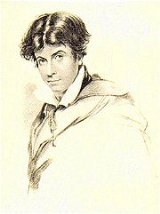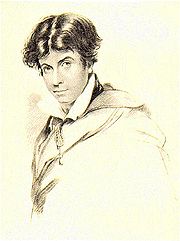
Cockney School
Encyclopedia
The "Cockney School" refers to group of cockney
poets writing in England in the second and third decade of the 19th century. The term came in the form of hostile reviews
in Blackwood's Magazine
in 1817. Its primary target was Leigh Hunt but included John Keats
and William Hazlitt
. John Scott
died after a duel over the controversy.
 Each of the writers was derided for a slightly different quality. Keats, for example, was accused of "low diction" for rhyming "thorns/fawns" in "Sleep and Poetry" and other rhymes which suggested a working class
Each of the writers was derided for a slightly different quality. Keats, for example, was accused of "low diction" for rhyming "thorns/fawns" in "Sleep and Poetry" and other rhymes which suggested a working class
speech. Hunt and Hazlitt were similarly vilified for their diction, but the criticisms were more ideological with them than with Keats. John Wilson Croker perpetuated the term "Cockney School" beyond the pages of Blackwood's in 1818 when he attacked Keats's Endymion
in the Quarterly Review
.
The term, and the campaign against Hunt and the others, was not a question of aesthetics
. It was, instead, an attack on the class background of the authors and their aspirations to the highest level of the literati, and it was, additionally, a reaction to the "Cockney" politics of the authors. The political, reformist agenda and the democratic ideology of Hunt and Hazlitt were offensive to the Blackwoods review staff, and the cultural and class background of the authors was introduced as a mechanism. Percy Bysshe Shelley
was accused of being similarly offensive politically, but the reviewers excused him for his genius
(and, of course, his high birth).
The second generation of the Romantic movement was as politically and economically revolutionary as it was aesthetically challenging to the status quo, and the controversy and partial reviewers responsible for the creation of the "Cockney School" epithet foreground how offensive it was to the establishment that lower class persons might emerge. According to the 1907 Nuttall's Brief Encyclopedia, the term was revived in the 1890s by working class London poets, but, although this may have been en vogue at the turn of the twentieth century, the term is currently remembered for the Romantic reference only.
Cockney
The term Cockney has both geographical and linguistic associations. Geographically and culturally, it often refers to working class Londoners, particularly those in the East End...
poets writing in England in the second and third decade of the 19th century. The term came in the form of hostile reviews
Literary criticism
Literary criticism is the study, evaluation, and interpretation of literature. Modern literary criticism is often informed by literary theory, which is the philosophical discussion of its methods and goals...
in Blackwood's Magazine
Blackwood's Magazine
Blackwood's Magazine was a British magazine and miscellany printed between 1817 and 1980. It was founded by the publisher William Blackwood and was originally called the Edinburgh Monthly Magazine. The first number appeared in April 1817 under the editorship of Thomas Pringle and James Cleghorn...
in 1817. Its primary target was Leigh Hunt but included John Keats
John Keats
John Keats was an English Romantic poet. Along with Lord Byron and Percy Bysshe Shelley, he was one of the key figures in the second generation of the Romantic movement, despite the fact that his work had been in publication for only four years before his death.Although his poems were not...
and William Hazlitt
William Hazlitt
William Hazlitt was an English writer, remembered for his humanistic essays and literary criticism, and as a grammarian and philosopher. He is now considered one of the great critics and essayists of the English language, placed in the company of Samuel Johnson and George Orwell. Yet his work is...
. John Scott
John Scott (editor)
John Scott , editor and publisher. He edited several liberal newspapers: the Statesman, which Leigh Hunt had recently founded; the Stamford News, published by John Drakard; Drakard's Paper , which he renamed The Champion; and the most notable, the London Magazine, which he revived, as a monthly,...
died after a duel over the controversy.

Working class
Working class is a term used in the social sciences and in ordinary conversation to describe those employed in lower tier jobs , often extending to those in unemployment or otherwise possessing below-average incomes...
speech. Hunt and Hazlitt were similarly vilified for their diction, but the criticisms were more ideological with them than with Keats. John Wilson Croker perpetuated the term "Cockney School" beyond the pages of Blackwood's in 1818 when he attacked Keats's Endymion
Endymion (poem)
Endymion is a poem by John Keats first published in 1818. Beginning famously with the line "A thing of beauty is a joy for ever", Endymion, like many epic poems in English , is written in rhyming couplets in iambic pentameter...
in the Quarterly Review
Quarterly Review
The Quarterly Review was a literary and political periodical founded in March 1809 by the well known London publishing house John Murray. It ceased publication in 1967.-Early years:...
.
The term, and the campaign against Hunt and the others, was not a question of aesthetics
Aesthetics
Aesthetics is a branch of philosophy dealing with the nature of beauty, art, and taste, and with the creation and appreciation of beauty. It is more scientifically defined as the study of sensory or sensori-emotional values, sometimes called judgments of sentiment and taste...
. It was, instead, an attack on the class background of the authors and their aspirations to the highest level of the literati, and it was, additionally, a reaction to the "Cockney" politics of the authors. The political, reformist agenda and the democratic ideology of Hunt and Hazlitt were offensive to the Blackwoods review staff, and the cultural and class background of the authors was introduced as a mechanism. Percy Bysshe Shelley
Percy Bysshe Shelley
Percy Bysshe Shelley was one of the major English Romantic poets and is critically regarded as among the finest lyric poets in the English language. Shelley was famous for his association with John Keats and Lord Byron...
was accused of being similarly offensive politically, but the reviewers excused him for his genius
Genius (literature)
The concept of genius, in literary theory and literary history, derives from the later 18th century, when it began to be distinguished from ingenium in a discussion of the genius loci, or "spirit of the place." It was a way of discussing essence, in that each place was supposed to have its own...
(and, of course, his high birth).
The second generation of the Romantic movement was as politically and economically revolutionary as it was aesthetically challenging to the status quo, and the controversy and partial reviewers responsible for the creation of the "Cockney School" epithet foreground how offensive it was to the establishment that lower class persons might emerge. According to the 1907 Nuttall's Brief Encyclopedia, the term was revived in the 1890s by working class London poets, but, although this may have been en vogue at the turn of the twentieth century, the term is currently remembered for the Romantic reference only.

